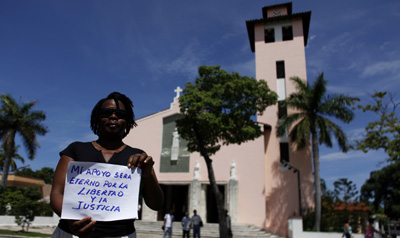Sunday marked the end of the four-month deadline Cuban President Raúl Castro had agreed to with representatives of the Cuban Catholic Church and the Spanish government to free 52 prisoners of conscience who remained in jail since the March 2003 crackdown against dissidents, known as the “Black Spring.” The Spanish foreign minister at the time, Miguel Angel Moratinos, said in Havana on July 8 that the move to release the prisoners “opens a new era in Cuba.” But have things changed in the EU regarding Cuba? Not really. Has anything changed on the island? Not really. On Monday, at midnight, 13 of the 52 prisoners remained in jailed.
“They are deceiving and have played with the church, the government of Spain, the European Union and with all the international community,” the leader of the Ladies in White, a group of relatives of the dissidents, Laura Pollán, told the BBC.
On October 25, in her first appearance at the EU Foreign Affairs Council after her appointment as Spanish foreign minister, Trinidad Jiménez said, “Things in the European Union move slowly.” Cuban relations were on her mind, given it was now her turn to speak for the member state, Spain, that has relentlessly advocated for an EU policy change toward the Cuban regime by rejecting the 1996 Common Position, which makes any political dialogue with Cuban authorities subject to democratic reforms and the release of political prisoners.
But on that day, Trinidad Jiménez thought things had changed. The 27 foreign ministers instructed the EU High Representative for External Relations, Catherine Ashton, to contact Cuban authorities to offer the opening of negotiations for a trade agreement. Ashton was given two months to test the Cubans’ willingness to enter into such negotiations and report back to the ministers in December. Not a single word in the 1996 Common Position was changed–there is a solid Sweden-led majority of EU countries reluctant to any modification for now. But many cried for an “opening.” Jiménez even called the Common Position “formally dead.”
According to several EU sources, not much is expected to change. First, the Cuban regime has rejected for at least three decades all EU offers to join the African, Caribbean, Pacific (ACP) trade framework, by which Europe grants commercial preferences to exports from former colonies. Second, Ashton has never been to Cuba and has no diplomatic experience in the region. And third, Cuba has already said no to the idea. On October 27, the Cuban foreign minister spoke clearly at the U.N. General Assembly: “The EU is dreaming when they think they can normalize relations with Cuba as long as the Common Position is in place.”
One Cuban journalist now exiled in Spain since his release from a Cuban prison in July told CPJ that with the EU-Cuba impasse and with the deadline for releases here and gone, he has little hope for his imprisoned colleagues.
“All those who believed there would be change in Cuba have been mocked,” said Ricardo González. Seven of the 13 dissidents still in prison have rejected the regime-church deal because they do not want to leave Cuba. (Seventeen of the journalists released were flown to Spain.) “They should simply open the prison’s gates and let those who want to leave the island leave, and those who want to go home, go home,” he added.
